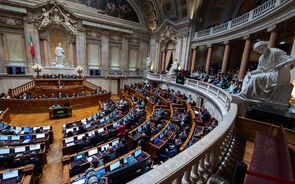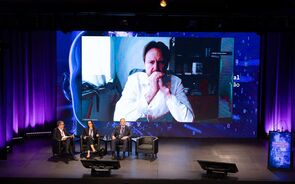European Central Bank holds rates at 2%
2 mensagens
|Página 1 de 1
cont
ECB Holds Key Rate, Declining to Follow Fed, as Recovery Lags
Last Updated: July 1, 2004 07:46 EDT
July 1 (Bloomberg) -- The European Central Bank kept its main lending rate at a six-decade low of 2 percent, declining to follow the U.S. Federal Reserve's quarter-point increase yesterday, as growth in Europe lags the U.S.
``Given the fragile nature of the recovery in Europe, a rate increase is unnecessary,'' said James Nixon, the economist in charge of the ECB's forecasting process until he joined Barclays Capital in London this year. ``The ECB will be on hold until it sees the recovery feeding through to the labor market.''
Demand in the U.S. and Asia has so far failed to ignite investment and boost hiring in Europe. That has helped keep prices in check, giving the ECB room to avoid higher borrowing costs. Manufacturing in the euro region slowed in June and German business confidence fell. The region's inflation rate declined in June as oil costs retreated from a 14-year high.
None of the 37 economists surveyed by Bloomberg News had expected a change in the ECB's main lending rate today. The bank will probably wait until the first quarter of 2005 before raising the rate by a quarter point, the median of 34 forecasts showed.
``The ECB won't be tied to the tugboat of the Fed, because in Europe, we're not at the start of a dynamic recovery like in the U.S.,'' said Lothar Hessler, deputy head of research at HSBC Trinkaus & Burkhardt KGaA in Dusseldorf.
ECB President Jean-Claude Trichet, 61, will hold a press conference at 2:30 p.m. in Frankfurt.
Inflation Eases
The Fed on Wednesday raised its overnight lending rate to 1.25 percent, the first increase since March 2000. The Swiss, Polish and Czech central banks increased interest rates in the past month. The Bank of England has raised its benchmark rate four times since November.
Pressure on the ECB to increase rates eased after falling oil prices helped push the inflation rate to 2.4 percent last month, from 2.5 percent in May, an EU report showed yesterday. The ECB is forecasting an average inflation rate of about 2.1 percent in 2004. It would be the fifth year the ECB fails to achieve its aim of keeping consumer price increases just below 2 percent.
A slowdown in money supply growth and reduced inflation expectations, two of the bank's gauges for future inflation, may also buy the bank time. Money supply growth slowed to a three-year low of 4.7 percent in May, from 5.5 percent in April.
The so-called breakeven inflation rate implied by French government bonds maturing in 2012, a measure of investors' expectations for average euro-region inflation over the maturity of the bonds, has dropped to 2.24 percent from 2.38 percent on June 3.
Growth Concerns
``If there is inflation pressure, then only from higher commodity costs,'' said Philipp Vorndran, chief strategist at Credit Suisse Asset Management, which helps oversee $241 billion in assets in Europe. ``There is no pressure from economic growth.''
The Organization for Economic Cooperation and Development in Paris is forecasting growth of just 1.6 percent in the euro region this year, compared with 4.7 percent in the U.S. The euro region expanded 0.6 percent in the first quarter, trailing the 1 percent expansion in the U.S. and 1.5 percent in Japan.
Germany, Europe's largest economy, grew an even smaller 0.4 percent, held back by stagnating consumer spending. Retail sales fell 1.7 percent in May from April, the biggest drop since November, as rising unemployment damps consumption, a report showed today.
``Domestic demand is the weak spot'' of the economy, said Peter Bofinger, a member of the German government's panel of economic advisers, in an interview.
`Hitting Us Hard'
In Japan, by contrast, optimism among manufacturers rose to the highest in 13 years in June amid surging demand for their goods from China and the U.S. The Bank of Japan's quarterly Tankan survey showed that the index of confidence among large manufacturers rose to 22 from 12 in March, exceeding the median forecast of 17 by 45 economists surveyed by Bloomberg News.
Companies including Germany's Adidas-Salomon AG, the world's second-largest maker of sporting goods, and BASF AG said this week they expect sales to rise in 2004. BASF, the world's biggest chemical maker, said raw material costs remain a burden.
Oil prices, as measured by Brent crude futures, have dropped about 12 percent since the start of June, to $34.50 per barrel at the close in London on Wednesday. They are still more than a fifth higher than a year ago, increasing companies' costs.
``Raw material prices have exploded,'' said Anton Boerner, president of the BGA exporters and wholesalers association, in an interview. ``That's hitting us hard.''
Debt Levels
Policy makers may also be reluctant to raise borrowing costs because European companies have higher levels of debt than their competitors in the U.S., Asia and elsewhere, making them more vulnerable to rising interest rates, the Bank for International Settlements said on Monday.
Investors expect the ECB to raise the price of money by the end of the year, interest rate futures trading shows. The yield on the three-month contract for December settlement was 2.37 percent at 11:47 a.m. in Frankfurt, a quarter point above the money market rate of 2.12 percent.
``We have seen the lows in interest rates,'' said the BGA's Boerner. The ECB will raise rates this year ``if the economic recovery is significant. Otherwise the ECB will do it from January.''
Last Updated: July 1, 2004 07:46 EDT
July 1 (Bloomberg) -- The European Central Bank kept its main lending rate at a six-decade low of 2 percent, declining to follow the U.S. Federal Reserve's quarter-point increase yesterday, as growth in Europe lags the U.S.
``Given the fragile nature of the recovery in Europe, a rate increase is unnecessary,'' said James Nixon, the economist in charge of the ECB's forecasting process until he joined Barclays Capital in London this year. ``The ECB will be on hold until it sees the recovery feeding through to the labor market.''
Demand in the U.S. and Asia has so far failed to ignite investment and boost hiring in Europe. That has helped keep prices in check, giving the ECB room to avoid higher borrowing costs. Manufacturing in the euro region slowed in June and German business confidence fell. The region's inflation rate declined in June as oil costs retreated from a 14-year high.
None of the 37 economists surveyed by Bloomberg News had expected a change in the ECB's main lending rate today. The bank will probably wait until the first quarter of 2005 before raising the rate by a quarter point, the median of 34 forecasts showed.
``The ECB won't be tied to the tugboat of the Fed, because in Europe, we're not at the start of a dynamic recovery like in the U.S.,'' said Lothar Hessler, deputy head of research at HSBC Trinkaus & Burkhardt KGaA in Dusseldorf.
ECB President Jean-Claude Trichet, 61, will hold a press conference at 2:30 p.m. in Frankfurt.
Inflation Eases
The Fed on Wednesday raised its overnight lending rate to 1.25 percent, the first increase since March 2000. The Swiss, Polish and Czech central banks increased interest rates in the past month. The Bank of England has raised its benchmark rate four times since November.
Pressure on the ECB to increase rates eased after falling oil prices helped push the inflation rate to 2.4 percent last month, from 2.5 percent in May, an EU report showed yesterday. The ECB is forecasting an average inflation rate of about 2.1 percent in 2004. It would be the fifth year the ECB fails to achieve its aim of keeping consumer price increases just below 2 percent.
A slowdown in money supply growth and reduced inflation expectations, two of the bank's gauges for future inflation, may also buy the bank time. Money supply growth slowed to a three-year low of 4.7 percent in May, from 5.5 percent in April.
The so-called breakeven inflation rate implied by French government bonds maturing in 2012, a measure of investors' expectations for average euro-region inflation over the maturity of the bonds, has dropped to 2.24 percent from 2.38 percent on June 3.
Growth Concerns
``If there is inflation pressure, then only from higher commodity costs,'' said Philipp Vorndran, chief strategist at Credit Suisse Asset Management, which helps oversee $241 billion in assets in Europe. ``There is no pressure from economic growth.''
The Organization for Economic Cooperation and Development in Paris is forecasting growth of just 1.6 percent in the euro region this year, compared with 4.7 percent in the U.S. The euro region expanded 0.6 percent in the first quarter, trailing the 1 percent expansion in the U.S. and 1.5 percent in Japan.
Germany, Europe's largest economy, grew an even smaller 0.4 percent, held back by stagnating consumer spending. Retail sales fell 1.7 percent in May from April, the biggest drop since November, as rising unemployment damps consumption, a report showed today.
``Domestic demand is the weak spot'' of the economy, said Peter Bofinger, a member of the German government's panel of economic advisers, in an interview.
`Hitting Us Hard'
In Japan, by contrast, optimism among manufacturers rose to the highest in 13 years in June amid surging demand for their goods from China and the U.S. The Bank of Japan's quarterly Tankan survey showed that the index of confidence among large manufacturers rose to 22 from 12 in March, exceeding the median forecast of 17 by 45 economists surveyed by Bloomberg News.
Companies including Germany's Adidas-Salomon AG, the world's second-largest maker of sporting goods, and BASF AG said this week they expect sales to rise in 2004. BASF, the world's biggest chemical maker, said raw material costs remain a burden.
Oil prices, as measured by Brent crude futures, have dropped about 12 percent since the start of June, to $34.50 per barrel at the close in London on Wednesday. They are still more than a fifth higher than a year ago, increasing companies' costs.
``Raw material prices have exploded,'' said Anton Boerner, president of the BGA exporters and wholesalers association, in an interview. ``That's hitting us hard.''
Debt Levels
Policy makers may also be reluctant to raise borrowing costs because European companies have higher levels of debt than their competitors in the U.S., Asia and elsewhere, making them more vulnerable to rising interest rates, the Bank for International Settlements said on Monday.
Investors expect the ECB to raise the price of money by the end of the year, interest rate futures trading shows. The yield on the three-month contract for December settlement was 2.37 percent at 11:47 a.m. in Frankfurt, a quarter point above the money market rate of 2.12 percent.
``We have seen the lows in interest rates,'' said the BGA's Boerner. The ECB will raise rates this year ``if the economic recovery is significant. Otherwise the ECB will do it from January.''
-
Info.
European Central Bank holds rates at 2%
tal como previsto...
European Central Bank holds rates at 2 percent (7:47am 07/01/04
LONDON (CBS.MW) -- The European Central Bank on Thursday, as predicted, held interest rates at 2 percent.
The move comes a day after the Federal Reserve hiked rates for the first time in the four years to 1.25 percent, but lagging European economic growth has kept bankers in Frankfurt in check.
European Central Bank holds rates at 2 percent (7:47am 07/01/04
LONDON (CBS.MW) -- The European Central Bank on Thursday, as predicted, held interest rates at 2 percent.
The move comes a day after the Federal Reserve hiked rates for the first time in the four years to 1.25 percent, but lagging European economic growth has kept bankers in Frankfurt in check.
-
Info.
2 mensagens
|Página 1 de 1
Quem está ligado:


